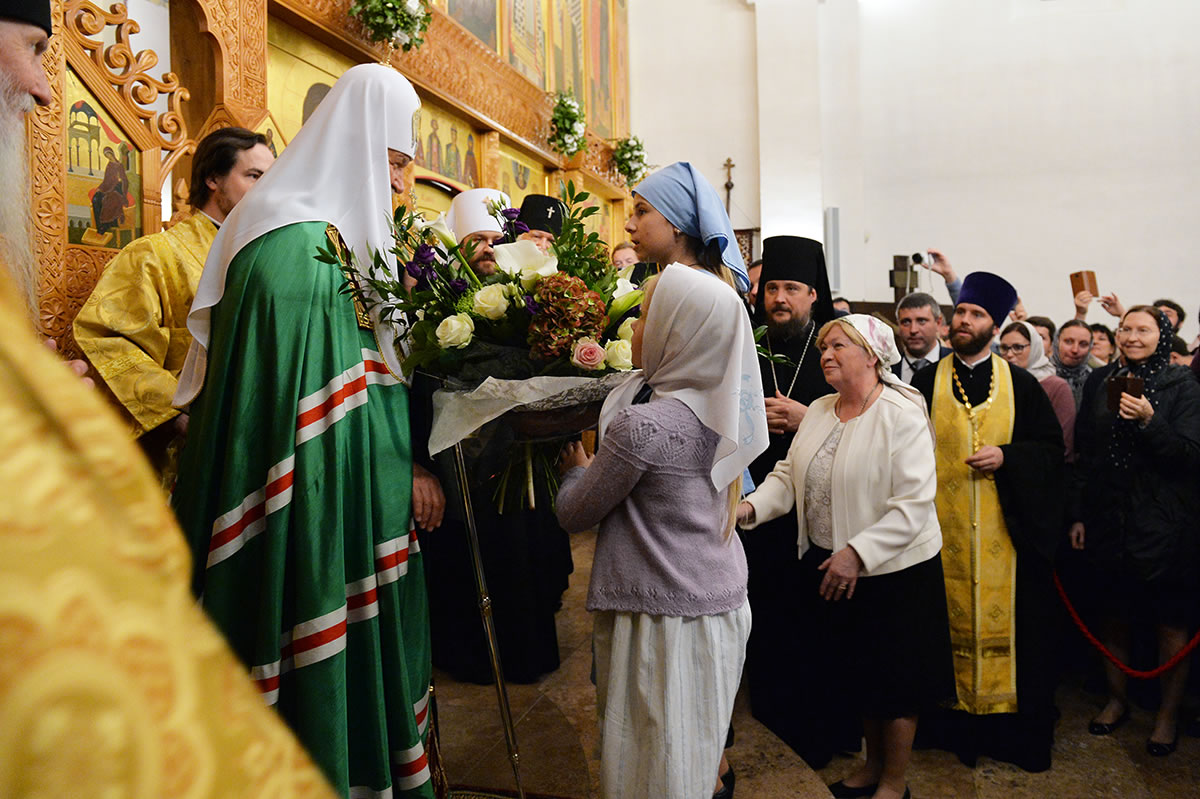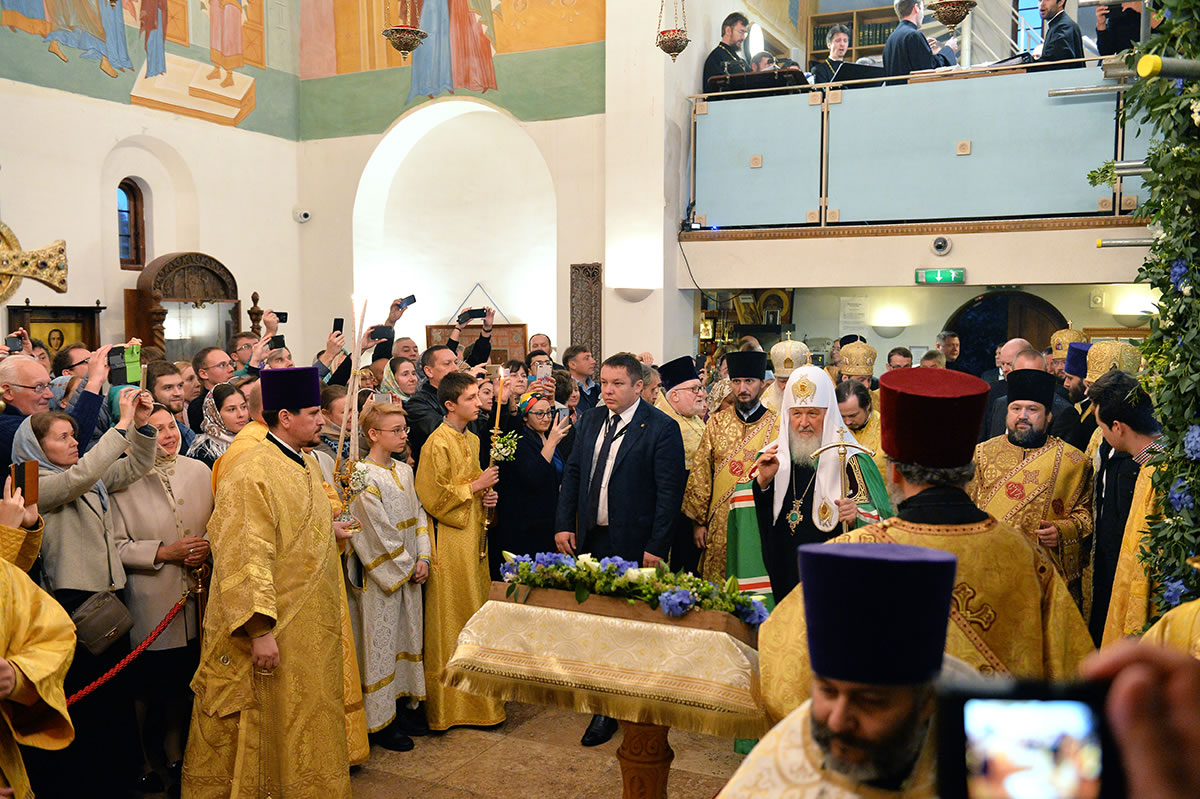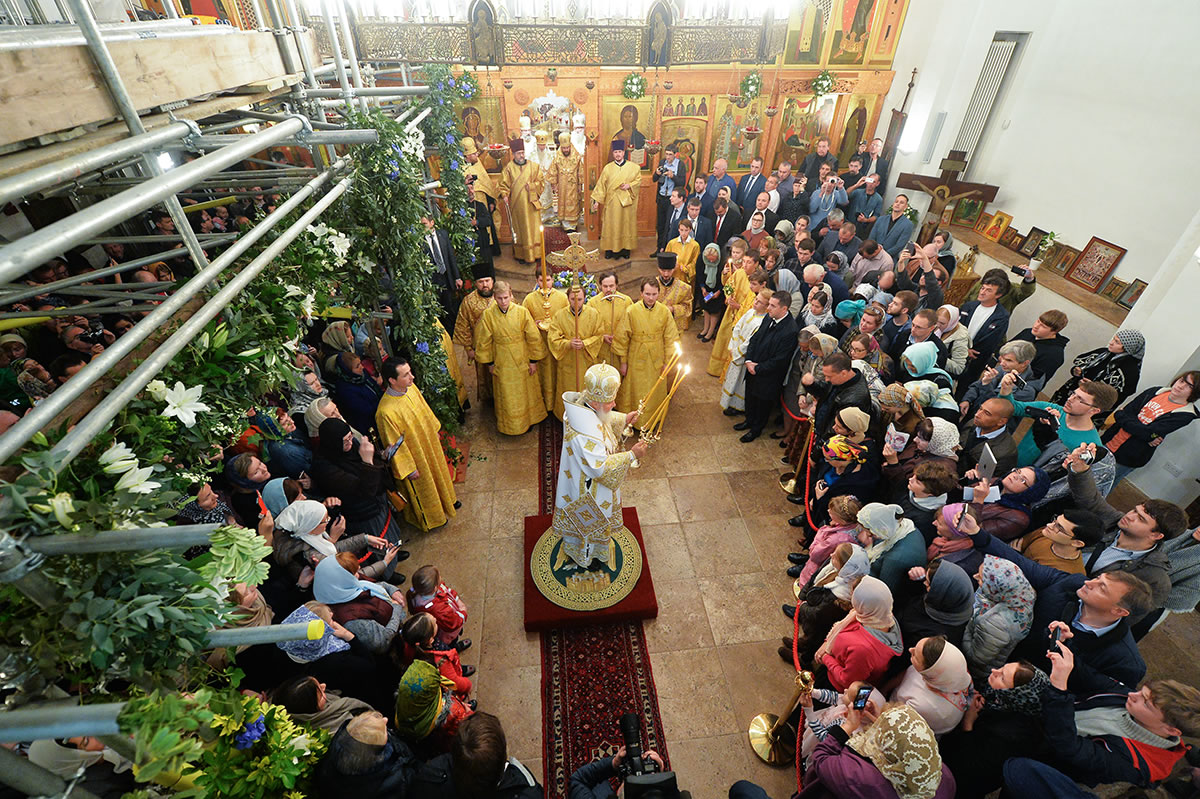
His Holiness Patriarch Kirill of Moscow and All Russia Performs All-Night Vigil at the Cathedral of the Dormition of the Mother of God of the Diocese of the United Kingdom of the Russian Church Abroad
Official website of the Synod of Bishops of the Russian Orthodox Church Outside of Russia – 19/10/16
On the evening of October 15, 2016, His Holiness Patriarch Kirill of Moscow and All Russia, during a visit to the United Kingdom, performed all-night vigil at London’s Cathedral of the Dormition of the Mother of God and the Holy Royal Passion-Bearers of the Russian Orthodox Church Outside of Russia.
The Primate of the Russian Orthodox Church was joined by His Eminence Metropolitan Ilarion of Volokolamsk, President of the Department of External Church Relations of the Moscow Patriarchate; His Eminence Archbishop Mark of Berlin and Germany of ROCOR; His Eminence Archbishop Michael of Geneva and Western Europe of ROCOR; His Grace Bishop Sergy of Solnechnogorsk, Head of the Administrative Secretariat of the Moscow Patriarchate; His Eminence Archbishop Elisei of Sourozh and His Grace Bishop Antony of Bogorodsk, Head of the Administration of Institutions Abroad of the Moscow Patriarchate.
The name of Queen Elizabeth II was commemorated during a litany.
At the end of the service, His Holiness greeted Archbishop Mark, who in response, said: “We express our heartfelt gratitude to Your Holiness, that despite your many responsibilities, you found time and strength to pray with us during all-night vigil in this holy temple, the Cathedral of the Dormition of the Mother of God and the Holy Royal Passion-Bearers.” As a memento of the occasion, Archbishop Mark gave His Holiness a painted icon of the Royal Passion-bearers.
In a sermon, His Holiness said to all those gathered in worship:
Your Eminences, Your Graces, honorable Vladyka Mark, dear fathers, brothers and sisters:
It is with a special emotion that I performed divine services today with you in this beautiful new church. I recall that approximately ten years ago, during an regular official visit to London, I saw this church from afar, which was still under construction, and I was told that it belonged to the Church Abroad. Although we were not yet united as one Church then, I was happy that the Russian community in Great Britain, as well as the community of the Moscow Patriarchate, will have a new temple, which is worthy of the history of this community and of the people who attend.
In fact, three hundred years ago, an embassy church was established in London. Remarkable clergymen have made their contributions to the development of Orthodox Christianity in this country. Today, as I visit the place where divine services were first celebrated, whence this community, in effect, originated, I remembered the names of these clerics: Protopriest Iakov Smirnov, Protopriest Evgeny Popov, who over the course of over a hundred years, one after the other, strengthened this Orthodox parish, which was then the only one in London.
When tragedy struck our Fatherland, and the people became divided, the nation was divided, this was reflected in the life of our much-suffering Church. We know that in the distant year of 1927, our united local Church community divided into two—one went under Metropolitan Evlogy (Georgievsky), the other under the Synod of the Church Abroad. This division, which continued for many decades, was never a real schism in a spiritual or ecclesiological sense, but a scar on the surface of the body of our Church, and by the mercy of God it was overcome. Today there is one Russian Orthodox Church, and as Patriarch I never divide parishes into which are Patriarchal and which are part of the Church Abroad. And today, during the unction, when I looked upon your faces, I saw the same people who fill our parishes in England, in Europe, in America, in Russia—everywhere. This is our Orthodox nation, and by Divine blessing, it is ministered to by one Russian Orthodox Church. This bolsters our strength: we do not waste time on rebuking each other, on debating any historical truths, but direct our efforts into edifying our people, strengthening the Orthodox faith and preaching Orthodoxy everywhere that our Church is found, including here in Great Britain.
When people live beyond the borders of their Fatherland, they find themselves in the midst of a different culture. For those who had little contact with other cultures before traveling abroad, did not speak other languages, this experience can be very difficult. Especially when they wish to settle down in a new land, find work and gain an education. And I know that your lives here are difficult, except maybe for the few who had made their fortune in their homeland, but are now able as a result to live abroad. But there are people who are at a crossroads, and life is not easy for them. It is these people whom I now address: remember that even in the most difficult of circumstances you have help and intercession—the aid of God, the Protection of the Most-Holy Mother of God and that of our saints.
Our ancestors knew this well, who found themselves abroad after the Revolution, often without a penny in their pockets, face to face with a new reality. What did our pious ancestors do first and foremost? They established a parish life. And the Lord showed them mercy, and accompanied them through great tribulations, but in the end, their descendants were able to adapt to their new circumstances and manage these difficult challenges.
Living abroad should strengthen every Orthodox Christian in faith, sharpen his religious zeal, coaxing them in the difficulties of life to depend most of all on prayer and the spiritual support that is provided by the temple of God. That is why we need churches in what we call “the remote abroad.” They become the places where they meet the living God and the community of Christians.
I wish with all my heart for you, Your Eminence, to the clergymen of this holy temple and all believers to preserve the traditions of your forefathers, which gave our people great strength in the past. And today this legacy give us the power to overcome difficulties, including those in daily Church life. A symbol of this victory is this remarkable church itself.
Some 20 years ago, the foundation stone was lain for this church. Today we see it practically finished, only the frescoes need to be completed. This is also a symbol of our faith, and the faith of those who came before us. This is a symbol that in the hearts of our people, wherever they may live, the flame of Orthodox faith and love for the Lord burns. We cannot allow this flame to weaken or be extinguished.
I invoke Divine blessings on you all, the blessings of All Russian Saints, the Holy New Martyrs and Confessors of our Church. May their intercession before the Lord strengthen the spiritual lives of Russians who live far from their homeland. In memory of today’s divine services, I would like to offer this icon of the Resurrection of Christ with a commemorative plaque that it was given by the Patriarch. When you kiss this icon, please remember your Patriarch in your prayers, for I am in great need of your prayers. May the Lord preserve you!
All those in attendance were also given small “Tikhvin” Icons of the Mother of God with a Patriarchal blessing.
His Holiness Patriarch Kirill was given a bouquet of flowers from the parish’s Sisterhood of St Xenia the Roman.
Since 1956, after the razing of the Church of St Philipp at what is now Victoria Bus Station, and until 1959, the Dormition Parish of the Russian Church Abroad conducted divine services at All Saints Church at Barons Court, W6. A house was purchased in 1931 for 100 pounds donated by Bishop Nikolai (Karpov), the first bishop of London of the Russian Church Abroad. Since 1959, the parish rented a church at Emperors Gate, London, SW7. After the lease expired in 1989, the parish decided to build its own church.
In 1990, a house and parcel were purchased for the church. In 1994 a temporary church was established at 57 Harvard Road.
On November 27, 1997, Archbishop Mark of Berlin, Germany and Great Britain lay the first stone of the Cathedral of the Dormition of the Mother of God on Harvard Road.
On Lazarus Saturday in 1999, the first divine service was celebrated there. Archbishop Mark himself became the Parish Rector.
In 2003, the lower Chapel of the Royal Martyrs was blessed with the minor consecration, and in 2005, with the great consecration performed by Metropolitan Laurus, First Hierarch of the Russian Orthodox Church Outside of Russia, along with other members of the Synod of Bishops.
In 2009, the iconostasis of the upper church was blessed, and in 2013, the bell tower was completed.
The church was built in the Pskov style, designed by architect Douglas Norwood. The latest materials and technology were used. A baptistery was installed in the lower chapel, and the upper church has “golosniki” installed in the wall [empty chambers to enhance acoustics], the design and construction of which were based on study in Reding University.
In order to avoid confusion due to there being two Russian Orthodox Dormition Cathedrals in London, upon the completion of the frescoes, the church of the Church Abroad will be rededicated to the Nativity of the Mother of God.
Press Service of the DECR/ patriarchia.ru




742452 649951Very good design and style and amazing topic matter, really little else we want : D. 443972